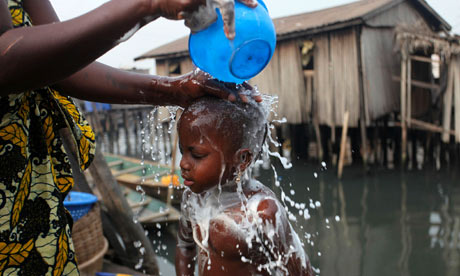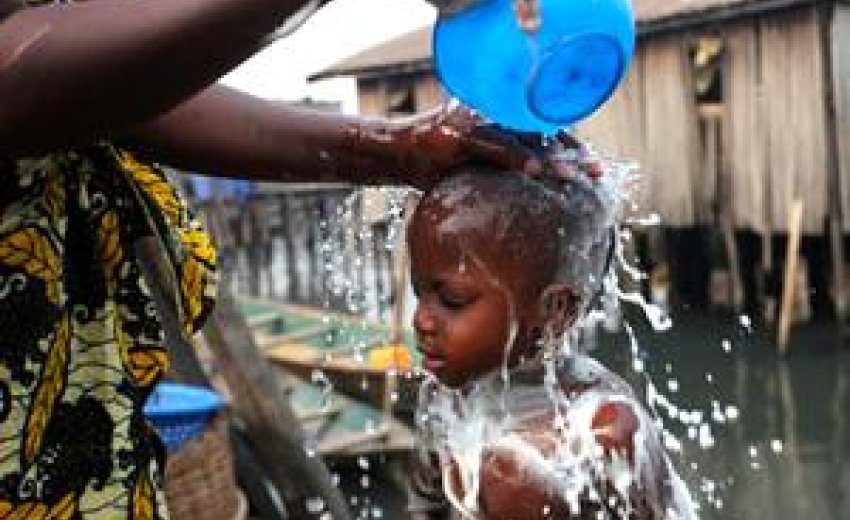The foundation has announced millions of dollars of funding for sanitation services in poor countries over the next few years and 'expects to be the key funder for innovation in this sector'
 |
| The funding should improve life in places such as the Makoko fishing community in Lagos, Nigeria. Photograph: Akintunde Akinleye/Reuters |
The foundation is to significantly expand its sanitation program with a $42m grant scheme to spur innovation in this area and a greater emphasis on encouraging behavior change in communities.
An estimated 2.6 billion people do not have access to safe sanitation and more than 1 billion people are understood to defecate in the open.
In a speech to the AfricaSan 3 conference in Rwanda on Tuesday, Sylvia Mathews Burwell, president of the foundation's global development program, said: "No innovation in the past 200 years has done more to save lives and improve health than the sanitation revolution triggered by the invention of the toilet. But it did not go far enough. It only reached one-third of the world. What we need are new approaches, new ideas. In short, we need to reinvent the toilet."
The foundation, in partnership with governments, universities, the US development agency, USAid, and the African Development Bank, wants to encourage the development of relevant tools and technologies that will improve basic sanitation, such as waterless toilets that do not rely on sewer connections and hygienic ways to empty pits and process and recycle waste. New ideas must cost no more than $0.05 per person per day and be easy to install, use and maintain. They must also be ideas that are relevant to specific communities and are what people in poor countries want.
Eight universities in Africa, Asia, Europe and North America have already been allocated a grant totaling $3m to invent a stand-alone toilet without piped water or sewer connection, while $12m is being used to develop pilot sanitation projects in sub-Saharan Africa, which may include faecal sludge management services. A grant of $8m will be used to support postgraduate education in water and sanitation.
The new grant money will bring the amount the Gates foundation has spent on water and sanitation over the past five years to $265m, but its director of water, sanitation and hygiene, Frank Rijsberman, expects this amount to grow significantly over the next few years.
"We expect to be the key funders for innovation in this sector," he said.
Rijsberman added that sanitation was still largely a neglected area, often eclipsed by efforts to improve access to safe water.
"Water is obviously important, but so many people focus on it, it's more 'touchy-feely'. Sanitation is something you don't talk about in polite conversation," he said.
Sanitation was, in fact, left out of the UN's eight millennium development goals (MDGs) when they were set in 2000 and was only included as a target of goal number seven – to ensure environmental sustainability – two years later, after successful lobbying from the NGOs (non-governmental organizations) WaterAid and Tearfund.
In its 2011 MDG progress report, published earlier this month, the UN said the world "is far from meeting" the target to halve the number of people with no access to basic sanitation. At the current rate of progress, it will take until 2049 to provide 77% of the global population with flush toilets and other forms of improved sanitation.
One of the aims of the AfricaSan conference, the third African conference on sanitation and hygiene, organized by the African Ministers' Council on Water, which runs from Tuesday to Thursday this week in Kigali, is to review progress towards meeting the MDG target and renew the international community's commitment to sanitation. Up to 700 participants, including ministers, policymakers, NGOs, civil society groups and academics from across the world, are attending the event.
More than 230 African civil society organizations, along with international organizations, such the Water Supply and Sanitation Collaborative Council, WaterAid and the End Water Poverty, are using the conference to put pressure on their leaders and international governments to take urgent action to improve sanitation on the continent. According to these organizations, only 31% of people living in Africa have adequate access to sanitation, despite sanitation and water being a recognized human right. "This is a situation which is having a devastating impact on the health, education, economic and social standing of the poorest people," the group said in a statement.
Diarrhoea linked to inadequate sanitation is now recognized as the biggest killer of children in Africa, and it is estimated that lack of safe water and sanitation costs the region about 5% of GDP each year. "Without strong and targeted action from governments and donors, this inequality of access and the resulting poverty looks set to increase," the group said.
The group is calling for governments and development partners to ensure 0.5% of GDP is spent on sanitation, and that these funds are targeted to those most in need, to work in partnership to ensure high-level co-ordination of funds, targets and practices, and to be more transparent so progress can be monitored and assessed.
